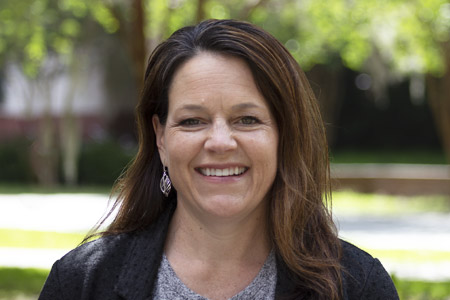Tara Sabo-Attwood, Ph.D.
Professor of environmental toxicology & chair of UF’s Department of Environmental & Global Health
College of Public Health and Health Professions
2020 Awardee
Tara Sabo-Attwood is an environmental toxicologist studying how pollutants impact people and ecosystems. Her research helps scientists identify potentially harmful toxins, enabling experts to protect consumers from microscopic pollutants and develop treatments for conditions associated with exposure.
But her interests are a two-way street: Sabo-Attwood, professor and founding director of “Promoting Happy, Healthy People,” a new incentive-based wellness program at the College of Public Health and Health Professions, also studies how ecosystems can impact humans, homing in on ways nature can be used in healthcare.
“Really, folks in environmental health try to understand two things that intersect: how the environment affects the health of people and organisms and how organisms, including humans, impact the environment,” she said “When studying the intersection of environment and health, one needs to see that the process is very circular because they impact each other. A lot of people always think environmental health is just how pollutants impact the health of people, but it’s much more than that – we have a big impact on the environment as well.”
Testing whether exposure to synthetic particles leads to increased vulnerability to respiratory viruses, including COVID-19, is a key part of Sabo-Attwood’s research. The bits of matter she studies, called nanoparticles, are small enough that a million of them could fit in the period at the end of this sentence, and their small size grants them unique properties. But although they’re key components of nearly 3,000 consumer products, the “jury is still out” on whether all nanoparticles, especially airborne ones, are completely safe, Sabo-Attwood said.
“Because we haven’t really worked with particles this small before, we’re asking whether there are unintended health effects that we don’t know about,” said Sabo-Attwood, who is currently leading a team of scientists studying whether nanoparticle-infused personal protective equipment can help protect healthcare workers from COVID-19. “If while we’re generating these new materials, we can in tandem assess the safety of them, we can refine and tweak these different particles, so we can still use them for their amazing properties, but also in a safe way.”
In 2019, she helped design the UF Health Children’s Healing Garden, an outdoor space to promote mental and physical wellbeing in patients who receive prescriptions to visit. Sabo-Attwood said her role in designing the garden led to an “unexpected twist” in her research, jump-starting her interest in studying the positive impacts nature can have on human health in addition to unraveling the impact of pollutants.
Sabo-Attwood earned her Ph.D. in biomedical sciences from UF before returning in 2011 as an associate professor. She has been a member of the U.S. Environmental Protection Agency’s Chartered Science Advisory Board since 2015 and was appointed as a Research Associate with the Smithsonian’s National Zoological Park and Conservation Biology Institute in 2018.
Sabo-Attwood, who has mentored nearly 100 students and is an advocate for women in science, said helping inspire new generations of scientists to follow their passions is central to her work.
“My work on nature and wellness really has allowed me to go on an adventure, which I hadn’t really thought about too much because I was studying infectious disease and toxicology,” she said. “If you had asked me what kind of scientist I expected to be 10 years ago, I probably would have answered differently.”
Sabo-Attwood is also the college’s associate dean of faculty development, cultural affairs and wellness programs and is a member of the university’s Center for Environmental and Human Toxicology and the Emerging Pathogens Institute.
She was selected as a Kavli Fellow by the National Academy of Sciences in 2011 and presented at a three-day conference alongside other top scientists from around the country.
Learn more about Sabo-Attwood’s research.


